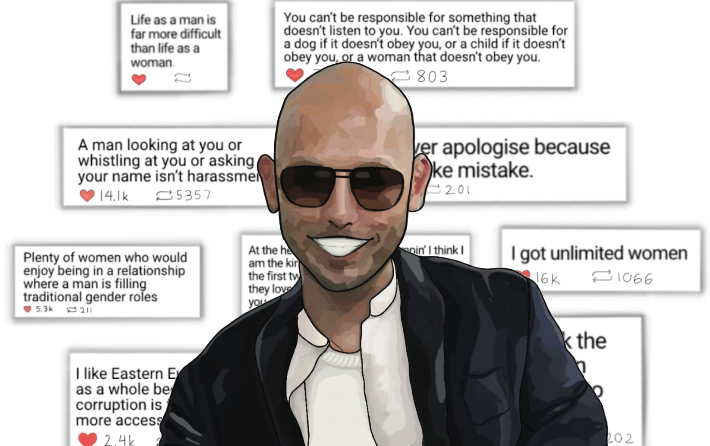Perspective: The Tate rage
Andrew Tate: a phase or our new reality?
How confident are you in your ability to think for yourself? Can you identify what’s wrong and what is right easily?
For many, or to anyone with enough common sense, the answers to these questions may seem straightforward. However, in the deep corners of the internet a fandom that lacks all these values is growing, led by one man alone: Andrew Tate.
Andrew Tate is a social media influencer and kickboxer who’s recently gained prominence for his misogynistic content. He advocates for domestic abuse and sexual assault, and has actually been accused of sexual assault and violence against women. Most notably though, he has gained a reputation for saying ridiculous, often outlandish statements that create a sensational appeal for his audience.
Especially prominent are his outrageous and demeaning comments against women. Examples of this include his take on “how are women allowed to drive” and how women are like animals in the sense that they are meant to “obey” their male superiors. These horrible comments are only part of what Tate’s platform is based on, and rather than being targeted for them, he is glorified by his fanbase.
Before being banned, Tate had a massive following on all forms of social media with over a million followers on both Instagram and Twitter. Along with this, his notoriety is amplified by the plethora of fan accounts on these platforms that support his behavior. Often in the form of short videos, these accounts take clips of him saying offensive and irrational things and portray them in a way that glorifies his messages, as well as Tate as a person. These videos also receive mass user interaction, gaining thousands of likes and follows.
What’s worse is that even though these videos contain obvious signs of hate and are derogatory, they are still being placed onto many social media users’ front pages by the algorithm. I remember a period of time when, on TikTok, every other video on my “For You” page was a video of Tate with some absurd comment and dramatic music echoing in the background. By being exposed to so many people, the culture that Tate is creating is only growing larger. Although Instagram, Twitter, and Tiktok have banned Tate from their platform for violation of hate speech guidelines, the videos of him are still surfacing by uploads from his fan accounts, proving the strength he has in the community.
In relation, evidence from The Observer found that followers of Tate are being instructed to mass-repost videos of him on social media, choosing the most controversial clips to maximize views and engagement.
From an outside perspective, it may seem like the whole Tate-gig is just a long-running joke and that despite him having an immense following, people still have enough common sense to at least recognize the man is a terrible person. However, the truth is far murkier. Although a single man like Tate can’t cause any extreme harm, he is perpetuating a culture that has been around for years: internet misogyny.
We tend to view the internet as a separate sphere compared to the real world—that things created online are not necessarily harmful due to its virtuality. However, when such a culture that is based on hateful and derogatory values is being promoted, the implications on the future generations could be dark.
Joshua Roose, a senior research fellow at Deakin University who specializes in extremism and masculinities, says there’s a strong “normative anti-women attitude in society” that is replicated online.
“[These] groups argue that women need to be subjugated, need to return to the domestic sphere, and really need to be put back in their historical place,” he told ABC Australia.

Roose added that Tate thrives on the motivation of toxic masculinity.
“There’s a strong push to mobilize masculinity, when they’re recruiting. To say, ‘you’re a man, you should be doing something, you should be fighting for something. What do you believe in? There’s a reason that you’re not achieving what you want to achieve. Society is fundamentally skewed against you. Join us,” Dr Roose says.
Evidently, Tate is echoing the same ideas that are commonly seen in internet misogyny echo chambers like the manosphere, which is where men’s rights activists, incels, and the far right convene. It has also been connected to online harassment and has glorified violence against women and misogynistic beliefs.
What’s alarming is that Tate has realized he can get away with whatever he wants to say, and to keep himself from losing his 15 minutes of fame, he continues recycling and spreading hateful rhetoric and ideas. The backing gained from his audience has given him a platform that gives him more power to say such offensive things and creates a negative cultural influence on the internet. It’s a vicious cycle.
The only method for preventing men like Tate from reappearing is to fight the problem at the root: stopping the culture before it gets too toxic and out of control.
By supporting his values, even as a joke, society is further promoting extremely discriminatory ideas to such vast, user-filled platforms. Elevating his platform is only contributing to a hateful cycle on the Internet that will prove detrimental for our society if continued. The Internet is not supposed to be a place full of hate, rather one of enjoyment, creativity, and entertainment.
We need to educate the next generation of adults that the things this man says is truly a form of hatred, and in no world should it be accepted or tolerated.
